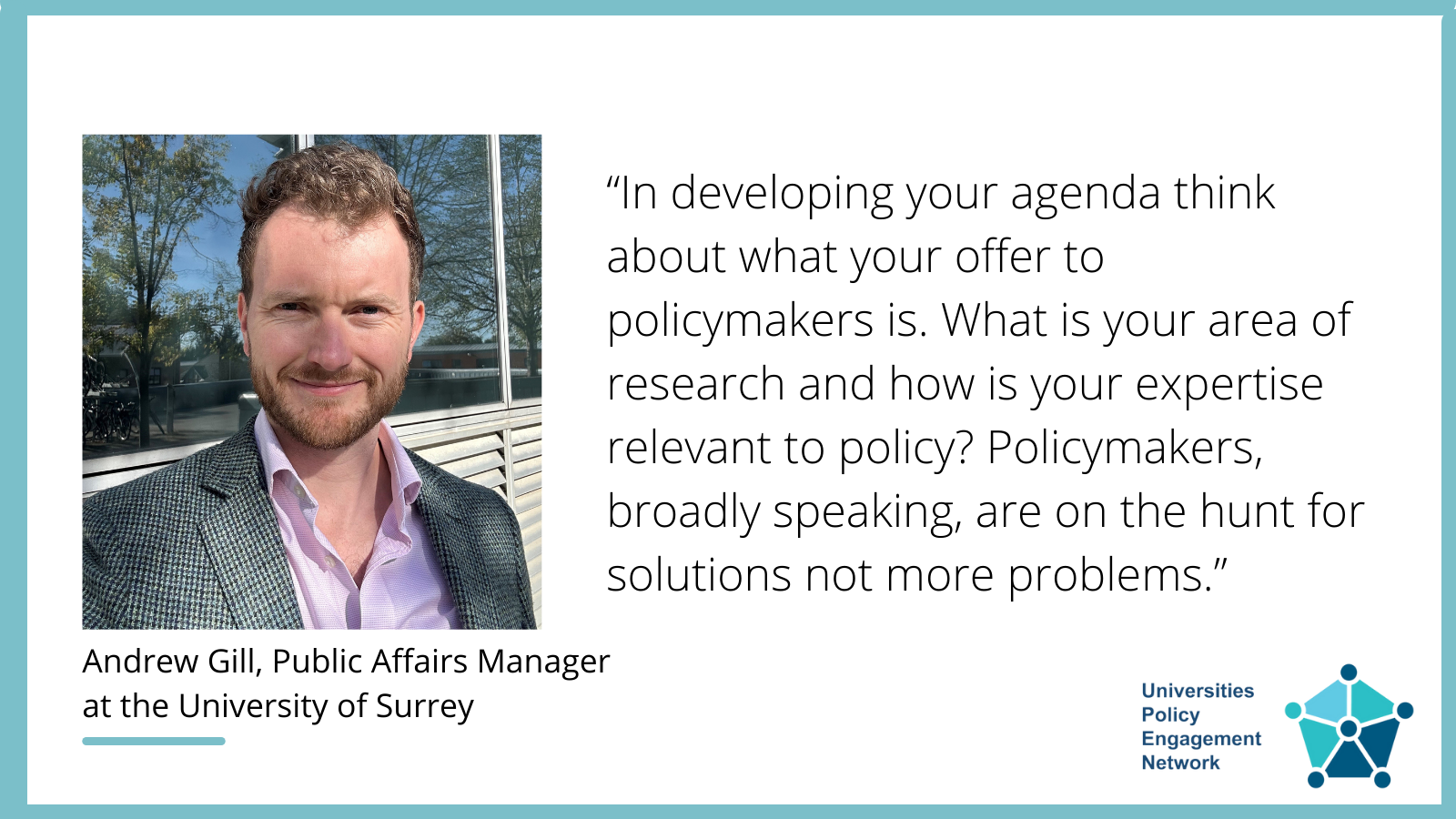Reflections on party conference season

The party conference “season” is that strange time in the year, usually in the early autumn, when Westminster politics is exported to a selection of northern cities and seaside towns in the south of England. For the parties themselves, be they in government or opposition, this is an important time in the political calendar when the leadership, MPs, a plethora of interest groups and the grass roots come together to debate and discuss the future of party policy.
In more recent years the party conferences have also developed into a wider opportunity for engagement with industry and civil society through the jam-packed programme of fringe events that now complements the main agenda at each conference.
Manchester v Liverpool
This year, in my capacity as Public Affairs Manager at the University of Surrey I attended Conservative Party Conference which took place in Manchester (1 – 4 October) and then Labour Party Conference in Liverpool (8 – 11 October).
At Conservative conference it was clear that thirteen years in government had taken a toll on the party. No longer able to blame the previous administration, the Government is faced with the challenge of presenting change while being the status quo. There was only really bandwidth for implementing existing policy rather than new ideas.
Labour, as you’d expect, had a very different feel. For a party that has been out of government for more than a decade and has been through a period soul searching and renewal the mood was much more upbeat. There was a genuine appetite for engagement and outside expertise. It was also clear they don’t yet have all the answers.
So, how do you engage with these different beasts? Having returned home and spent some time in more familiar surroundings, I have formed several reflections on my time spent at party conferences and some advice that I hope will be of interest to academics and knowledge brokers seeking to achieve policy impact.
Firstly, for successful engagement, ensure you have defined objectives. Secondly, have a clear agenda, and don’t be a wallflower.
Establish your objectives
If you are considering attending any of the party conferences, a logical place to start is considering the “why?”, or, more bluntly, “what’s the point?”. In my view there are three broad categories:
1 - Achieve policy influence.
This is a very defined objective which requires an unambiguous response to a policy issue or challenge. However, if the policy is currently going through consultation or legislative scrutiny your evidence base may be more effectively shared via those channels. A targeted conference programme can help amplify this.
2 - Establish profile with policy audiences.
This is a broader objective and one well-suited to party conferences which, if nothing else, bring a broad set of policy stakeholders under one roof. The next consideration is “what’s your agenda”, for more on which see below.
3 - Building your network.
Party conferences are a great way to build your network amongst policymakers and stakeholders as you can cover a lot of ground in a short amount of space and time. Nevertheless, I’d still recommend a clear agenda to help establish a more meaningful and targeted networking experience.
What’s your agenda?
Having considered your objectives, the next step is to think “what’s my agenda?”. This is less transactional, but more about where your being at conference can help to “add value” for yourself and those you are seeking to interact with.
Alignment with the policy agenda
Firstly, consider where your agenda interacts with the broader policy agenda. If it is high on the list then there will be more appetite for engagement, though likely with more competition from others engaging on the same topic. If it is lower on the agenda your time at conference could be more challenging as minds are on other matters.
At Surrey we developed our engagement priorities around artificial intelligence (AI), leveraging the considerable expertise of our pan-university Institute for People-Centred AI. In the space of a year, AI has rocketed up the policy agenda and we’ve engaged every step of the way. For the conference, we launched our own policy paper “AI: Governing the ungovernable” which was discussed at panel events and private roundtables.
Our other focus area was medical training in the context of the NHS workforce of the future, which, shortly after the publication of the NHS Long Term Workforce Plan, resonated strongly among stakeholders with an interest in challenges facing one of the biggest areas of government spending.
Surrey has recently launched a new medical school which will receive its first students in September 2024. This builds on more than 40 years of nursing at Surrey, a core pillar in our wider multidisciplinary environment which includes midwifery, paramedic science, physician associate and psychology programmes. So, NHS workforce is a topic where the University has considerable insight and expertise.
Don't be a wallflower – be confident in your policy offer
Party conferences are not a place to simply showcase. You will be up against a multitude of other organisations with competing interests, many of whom have bigger profiles or much larger conference budgets than universities to help them achieve share of voice. In developing your agenda think about what your offer to policymakers is. What is your area of research and how is your expertise relevant to policy? Policymakers, broadly speaking, are on the hunt for solutions, not more problems. Pitch your ideas in ways that are a) implementable, and b) ideally cost-neutral if not cost-saving. Also, consider if your research and recommendations can be de-stilled into two pages, also known as policy briefs.










































































































